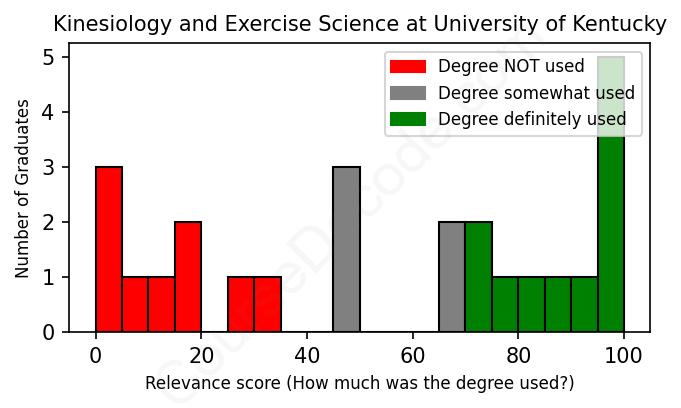
First, some facts. Of the Kinesiology and Exercise Science graduates from University of Kentucky we've analyzed , here's how many have used (or NOT used) their degree in their career:

These are estimates based on AI analysis of 25 LinkedIn profiles (see below).
The verdict? Significantly below average. Overall, with an average relevance score of 54%, Kinesiology and Exercise Science graduates from University of Kentucky have a much lower likelihood (-13%) of finding work in this field compared to the average graduate across all fields:
And for comparison, here's the chart for all profiles we've looked at across all degrees.
Also, after graduating, 72% of these graduates have pursued further education other than another Bachelor's degree (such as a Masters degree or other), compared to the average across all profiles of 35%. This suggests you may need more than just a Bachelors degree to be competitive as a Kinesiology and Exercise Science graduate.
See the details:
|
Relevance score: 10% We think this person has NOT gone into a career related to their degree. We think this person has NOT gone into a career related to their degree.
DEGREE INFOGraduated in 2014 from University of Kentucky with a Bachelor of Science (B.S.) in Kinesiology and Exercise Science. No other secondary education since. JOB HISTORY SINCE GRADUATIONIntern Happy and Healthy Ways Jan 2014 - May 2014 Physical Therapy Coordinator  Bluegrass Orthopedics Sep 2014 - Oct 2015 Claims Representative  Kentucky Employers' Mutual Insurance (KEMI) Oct 2015 - Present ABOUTNo information provided. |
The top 10 most common jobs done by the graduates we've analyzed (ranked most common to least) are:
When looking at the careers of people who graduated with a degree in Kinesiology and Exercise Science from the University of Kentucky, it seems like there are a couple of common paths they tend to follow. A lot of graduates move into health-related fields, especially roles directly tied to physical therapy or fitness training. Positions like Physical Therapist, Certified Personal Trainer, and Strength and Conditioning Coach stand out as highly relevant and closely aligned with their academic training. There are also several who step into academic roles like Adjunct Professor or internship opportunities that keep them rooted in their field. However, not everyone stays in a position that directly relates to their degree; many end up in roles that don't take advantage of their specialized knowledge, such as sales and administrative positions.
Overall, while a number of these jobs are quite relevant to Kinesiology and Exercise Science, there are also a significant number of graduates who wind up in unrelated fields. Positions in sales, customer service, and other corporate roles don’t really tap into the skills or knowledge acquired through their degree. It highlights an interesting reality: even with a focused education, graduates might take on jobs where their degree isn't directly applied. So, while many find fulfilling careers in fitness and health, others may find themselves venturing into diverse paths that don’t necessarily relate to their studies. It's a mixed bag, but at least there's a strong core group making an impact in health and wellness-related fields!
Here is a visual representation of the most common words in job titles for Kinesiology and Exercise Science graduates (this is across all Kinesiology and Exercise Science graduates we've analyzed, not just those who went to University of Kentucky):

Graduates from the University of Kentucky with degrees in Kinesiology and Exercise Science tend to have a fairly diverse range of career trajectories. Right after graduation, many land roles that utilize their knowledge in physical fitness and rehabilitation, such as physical therapy technicians, personal trainers, and strength and conditioning coaches. These entry-level jobs seem to set the stage for graduates to explore various career paths within their field, with a notable number transitioning into roles related to physical therapy or sports performance coaching within the first five years. For instance, many move on to become licensed physical therapists after further education or gain specialized roles in sports management and wellness programs.
However, as we look at the longer term, like ten years post-graduation, the picture gets a bit mixed. While there are success stories of graduates climbing into higher positions in athletic training and health services, others find themselves entering unrelated fields or taking more general roles in sales, management, or administrative positions. This shift suggests that some graduates may not stay directly tied to their Kinesiology and Exercise Science roots. Overall, while many seem to launch successful careers relevant to their degrees, there’s also evidence that some drift into various pathways, indicating a combination of strong outcomes along with some less direct career applications.
Getting a Bachelor’s degree in Kinesiology and Exercise Science, whether at the University of Kentucky or elsewhere, tends to be on the moderate side in terms of difficulty. You'll definitely have to dive into some science courses, like anatomy and physiology, which can be pretty challenging if you're not used to that kind of material. There’s also a mix of hands-on learning and labs, which some students love and others find a bit tougher. Overall, if you have a passion for fitness, health, and sports, it won't feel impossible, and many people find it enjoyable. Just be prepared to stay organized and keep up with your assignments, and you'll likely do just fine!
Most commonly, in the LinkedIn profiles we've looked at, it takes people 4 years to finish a Bachelor degree in Kinesiology and Exercise Science.
When you look at the job trajectories of these Kinesiology and Exercise Science grads from the University of Kentucky, the overall money picture is kind of mixed. Some have worked their way up into decent roles, like the Inventory Analyst and the Physical Therapist, which can pay pretty well. Others started in more entry-level positions like selling tickets or personal training, which typically don't stack up as well financially. Plus, quite a few have moved around a lot, likely in search of better opportunities or to focus on different interests, so it looks like they’re hustling to build their careers. All in all, while some seem to be doing well, especially in healthcare and managerial roles, others are still figuring it out, which is pretty common in any field. So, you might want to consider the broad range of salaries and career paths when thinking about what you want to do with a similar degree!
Here is a visual representation of the most common words seen in the "about" section of LinkedIn profiles who have a Bachelor degree in Kinesiology and Exercise Science (this is across all Kinesiology and Exercise Science graduates we've analyzed, not just those who went to University of Kentucky). This may or may not be useful:

Here are all colleges offering a Bachelor degree in Kinesiology and Exercise Science (ordered by the average relevance score of their Kinesiology and Exercise Science graduates, best to worst) where we have analyzed at least 10 of their graduates: